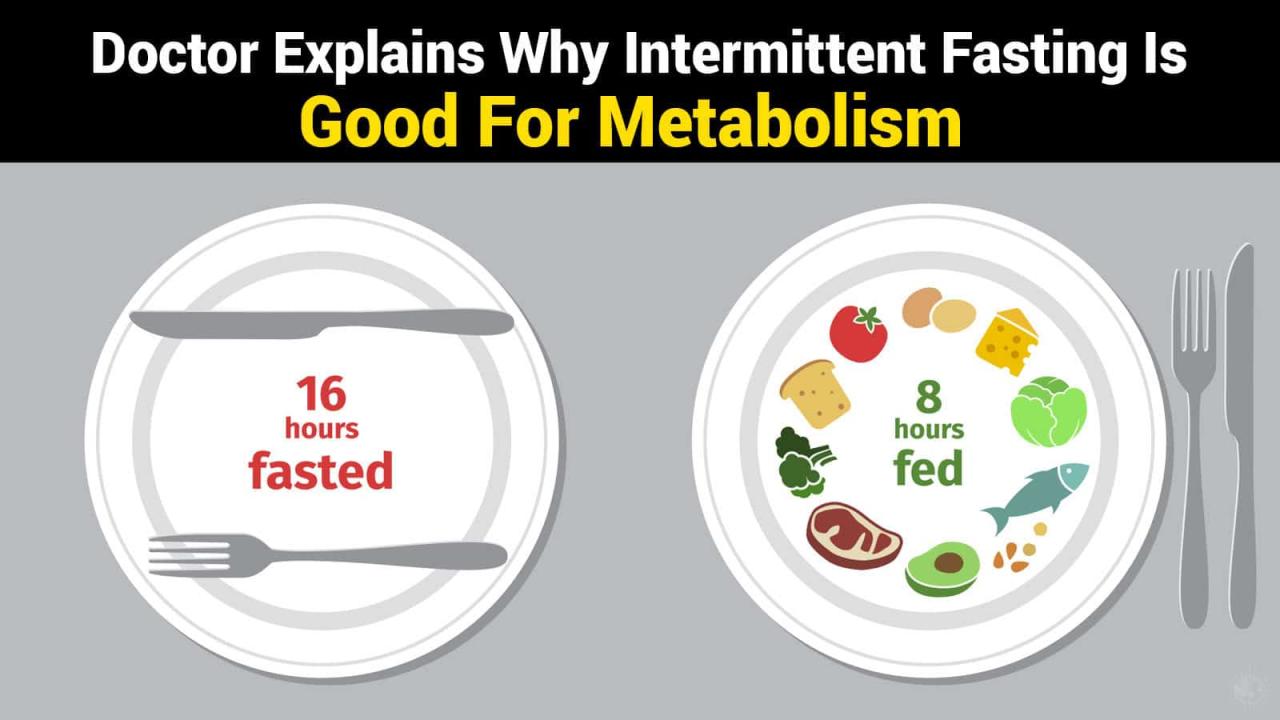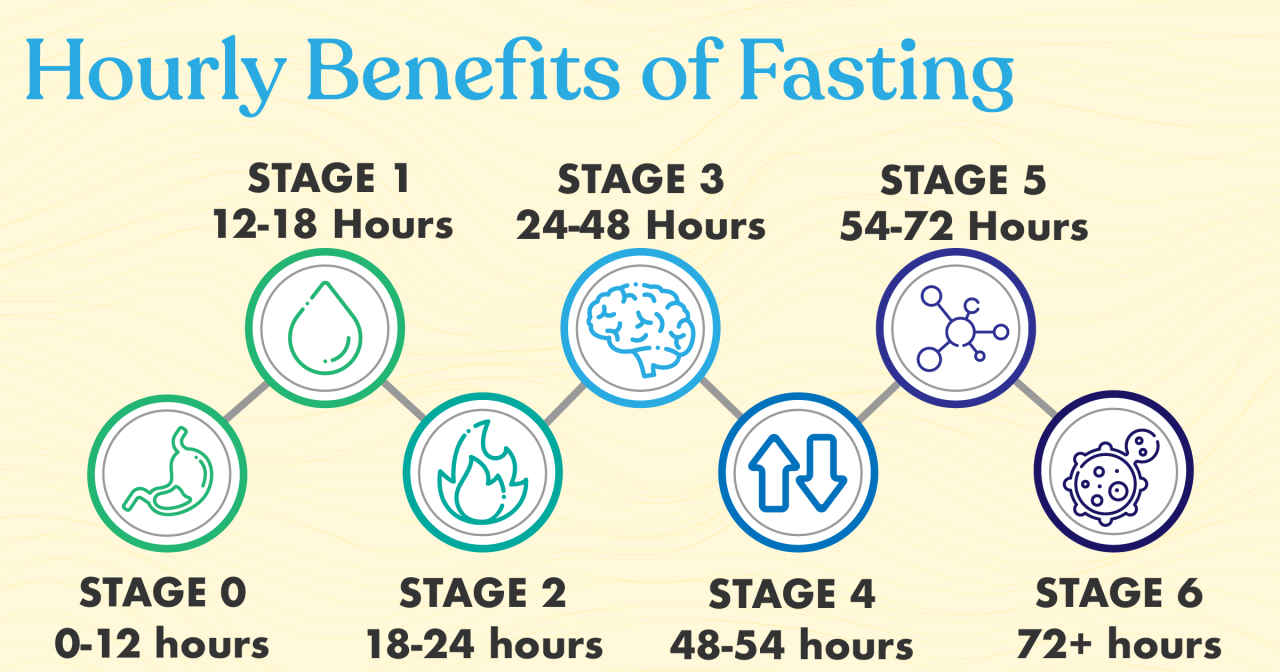Delving into the realm of intermittent fasting and metabolism, this comprehensive guide aims to shed light on how fasting can influence our metabolic processes. From specific changes to long-term effects, this topic is sure to intrigue and inform readers.
Benefits of Intermittent Fasting on Metabolism
Intermittent fasting has been shown to have several positive effects on metabolic processes, which can lead to improved overall health and weight management.
Increased Insulin Sensitivity
Intermittent fasting can help increase insulin sensitivity, allowing cells to better respond to insulin and regulate blood sugar levels. This can reduce the risk of developing insulin resistance and type 2 diabetes.
- During fasting periods, the body depletes its glycogen stores and starts burning fat for energy. This process can lead to a reduction in insulin levels and an increase in insulin sensitivity.
- Intermittent fasting can also promote autophagy, a process where the body removes damaged cells and toxins, which can contribute to improved insulin sensitivity.
Enhanced Fat-Burning
Intermittent fasting can stimulate the body to switch from using glucose as its primary energy source to burning fat. This can lead to increased fat metabolism and weight loss.
- When in a fasted state, the body starts breaking down stored fat for energy, which can result in a decrease in body fat percentage over time.
- Intermittent fasting can also increase the production of norepinephrine, a hormone that helps break down fat cells for energy.
Long-Term Effects
Engaging in intermittent fasting on a regular basis can have long-term benefits for metabolism, including improved mitochondrial function, reduced inflammation, and enhanced cellular repair processes.
- Studies suggest that intermittent fasting can promote mitochondrial biogenesis, the process of creating new mitochondria in cells, which can enhance energy production and metabolism.
- Intermittent fasting has been shown to reduce markers of inflammation in the body, which can help protect against chronic diseases associated with inflammation.
- By promoting autophagy, intermittent fasting can support cellular repair mechanisms, leading to improved overall cellular health and longevity.
Different Types of Intermittent Fasting and Their Effects on Metabolism
Intermittent fasting encompasses various approaches that involve alternating periods of eating and fasting. Each type of intermittent fasting can have different effects on metabolism due to the duration and frequency of fasting periods.
16/8 Method
The 16/8 method involves fasting for 16 hours and restricting eating to an 8-hour window each day. This approach can help regulate blood sugar levels, improve insulin sensitivity, and promote fat loss. By limiting the eating window, the body has more time to enter a fasting state, leading to increased fat oxidation and metabolic rate.
5:2 Method
In the 5:2 method, individuals eat normally for five days a week and consume a very low-calorie diet (around 500-600 calories) on the other two days. This intermittent fasting pattern can enhance metabolic flexibility, improve cellular repair processes, and support weight management.
The periodic calorie restriction stimulates autophagy, a process that removes damaged cells and promotes overall metabolic health.
Alternate-Day Fasting
Alternate-day fasting involves alternating between days of regular eating and fasting. This approach can have significant effects on metabolism by promoting fat loss, reducing inflammation, and improving insulin sensitivity. The intermittent fasting pattern can also lead to changes in gene expression related to longevity and metabolic health.
Effect of Fasting Period Duration
The duration of fasting periods plays a crucial role in metabolic adaptations. Longer fasting periods, such as those seen in alternate-day fasting, allow the body to deplete glycogen stores and transition to utilizing stored fats for energy. This shift in fuel utilization can lead to increased ketone production, which has positive effects on metabolism, including improved mitochondrial function and enhanced fat burning.
Metabolic Changes During Fasting Periods
Intermittent fasting triggers a series of metabolic changes in the body to adapt to the absence of food intake. During fasting periods, the body shifts from using glucose derived from carbohydrates as its primary energy source to utilizing stored fats for fuel.
This metabolic switch is crucial for sustaining energy levels and supporting various physiological functions.
Role of Hormones in Regulating Metabolism During Fasting
Several hormones play a key role in regulating metabolism during fasting, ensuring that the body has a constant supply of energy to function optimally.
- Insulin: When food is consumed, insulin levels rise to help transport glucose into cells for energy production. During fasting, insulin levels decrease, signaling the body to switch to using stored fats for energy.
- Glucagon: As insulin levels drop, the hormone glucagon is released to stimulate the breakdown of glycogen (stored glucose) in the liver, releasing glucose into the bloodstream to maintain blood sugar levels.
- Cortisol: Known as the stress hormone, cortisol is also released during fasting to help mobilize energy reserves, including fats, to meet the body's energy demands.
Switching from Glucose to Stored Fats as a Source of Energy
During fasting periods, the body undergoes a metabolic shift from using glucose to stored fats as the primary source of energy. This process involves several steps to ensure a continuous supply of energy:
- The depletion of glycogen stores: Initially, the body utilizes glycogen stores for energy, which are derived from carbohydrates. As these stores deplete, the body transitions to burning stored fats.
- Lipolysis: In response to decreased insulin levels and increased glucagon, the process of lipolysis is activated. This involves the breakdown of triglycerides (fats) into fatty acids and glycerol for energy production.
- Ketogenesis: The liver converts fatty acids into ketone bodies, which can be used by tissues, including the brain, as an alternative fuel source. This metabolic pathway, known as ketogenesis, is essential for sustaining energy levels during fasting.
Impact of Intermittent Fasting on Weight Loss and Metabolic Rate

Intermittent fasting has been shown to have a significant impact on weight loss and metabolic rate. When individuals engage in intermittent fasting, they typically consume fewer calories overall, leading to weight loss over time. Additionally, intermittent fasting can also affect the body's metabolic rate, which plays a crucial role in how efficiently calories are burned for energy.
Research Studies on Intermittent Fasting and Metabolic Rate
- One study published in the Journal of Translational Medicine found that intermittent fasting can lead to an increase in metabolic rate, potentially aiding in weight loss.
- Another study in the American Journal of Clinical Nutrition showed that intermittent fasting may enhance metabolic health by improving insulin sensitivity and reducing inflammation.
Mechanisms of Intermittent Fasting on Metabolic Rate
- Intermittent fasting can promote weight loss by increasing the body's sensitivity to insulin, which helps regulate blood sugar levels and can lead to a reduction in fat storage.
- During fasting periods, the body switches from using glucose as its primary energy source to burning stored fat for fuel, which can contribute to weight loss and metabolic rate changes.
Summary

In conclusion, the intricate relationship between intermittent fasting and metabolism offers a fascinating glimpse into how our bodies adapt and respond to different fasting methods. With potential benefits for weight management and metabolic rate, exploring this connection further can lead to a deeper understanding of our overall health.
Clarifying Questions
How does intermittent fasting affect metabolism?
Intermittent fasting can enhance metabolic processes by promoting changes in hormone levels that regulate metabolism, leading to improved fat burning and energy utilization.
What are the different types of intermittent fasting and how do they impact metabolism?
Various methods like 16/8, 5:2, and alternate-day fasting affect metabolism differently, influencing factors such as insulin sensitivity and metabolic rate.
Can intermittent fasting lead to long-term changes in metabolism?
Studies suggest that intermittent fasting may have lasting effects on metabolism, potentially improving metabolic flexibility and overall health in the long run.